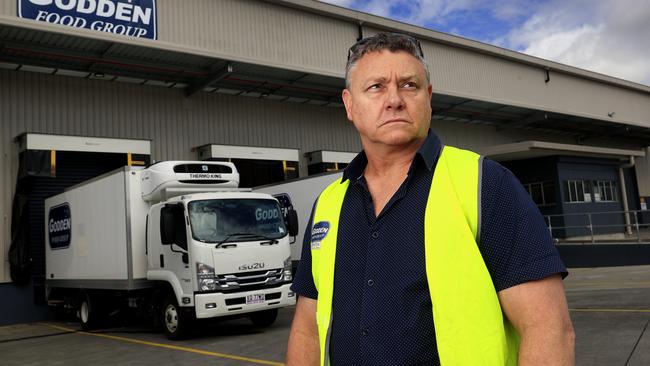Food suppliers calls for close contact rule to be abolished amid supply chain chaos
Distributors are spending up to $5000 a week on testing, losing millions and having to stand down half of all truck drivers due to unworkable close contact rules.
Australia’s $11bn food distribution industry is calling on close contact rules to be scrapped, saying it is crippling livelihoods and sparking chaos in the supply of food to cafes, restaurants and essential institutions like hospitals and child care centres.
George Sofanios, a director of Newcastle-based food distributor Red Funnel, was forced to shut his doors for 10 days over Christmas — normally his busiest period — at a cost of $1m.
Like many other independent food distributors, he says the close contact rule has become redundant, given that more than 90 per cent of adult Australians have received two Covid-19 vaccinations.
“I don‘t think you need to have a close contact rule. When people are sick, they don’t come to work,” Mr Sofanios said.
“We send them home or halfway through the day. It’s something that needs to be managed by the business, by the individual. The government puts everything else back onto business, so why do they want to hold onto this one that damages businesses the most.”
The close contact rule has heaped pressure on supply chains, already crunched during the pandemic, limiting the supply of food to restaurants, pubs, hospitals and child care centres and other commercial kitchens.
Coles and Woolworths have also warned of shortages across some foods.
National Cabinet last week limited the definition of close contacts to people who have spent at least four hours with a confirmed case in a household or household like setting.
But as national Covid cases hurtle towards 100,000 a day by the end of the week — infecting entire households — food distributors say the country must now embrace living with the virus.
Gold Coast-based food distributor, Jeff Godden, said the close contact rule had forced him to stand down almost half of his truck drivers, fuelling business losses similar to the start of the pandemic.
He estimates in the past two weeks he has lost hundreds of thousands of dollars.

“Our customer base is feeling it even worse than we are, being the hospitality industry. Restaurants, cafes, clubs, pubs … any venue that would be categorised as hospitality, they’re now closing,” Mr Godden said.
“So what we’re getting is a massive downturn in business and we’re back to where we were pretty much two years ago.
“Adding further insult to injury is food distributors must RAP (rapid antigen) test their staff daily at costs between $500 to $5,000 per week, if they can source them that is, with no government support whatsoever, at a time they are realising huge financial losses due to operator closures and consumers cancelling hospitality reservations en masse”.
Although Mr Godden welcomed border re-openings, he said the food distribution and hospitality business was better off when borders were shut. He now fears that some of his customers may never re-open.
“They talk about cases, and they report cases. I mean, to me, it’s a moot point. We all knew that we would get cases once we opened the border and it shouldn’t be the issue.”
“The health advice, and I’m talking about the Queensland government, was that we reach the target and vaccination levels, open the borders, live with the virus and it would be business as usual.
“What’s happening now is not business as usual. To me, they’ve changed the rules. They’ve tried to move the goalposts.”
Richard Forbes, chief executive of Independent Food Distributors of Australia, the peak industry body whose members supply food to almost 100,000 commercial customers, said it was wrong for governments to open up the economy and still require people to isolate.
“Governments, both state and federal, cannot make a decision to open our borders and let Covid run free as the population became 90 per cent vaccinated then, at the same time, tell business their staff must isolate if they are a close contact of a person who is Covid positive,” Mr Forbes said.
“Warehouses are closing, cafes and restaurants are closing and this is only the tip of the iceberg. As cases double over the next few weeks, the situation will dramatically worsen and the ability of food distributors and cafes and restaurants to source food or even remain open will become more difficult.
“We need to scrap the close contact rule immediately and let business and their employees decide a way of working.”



